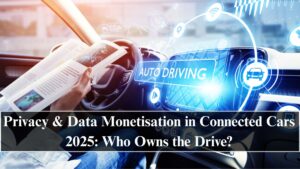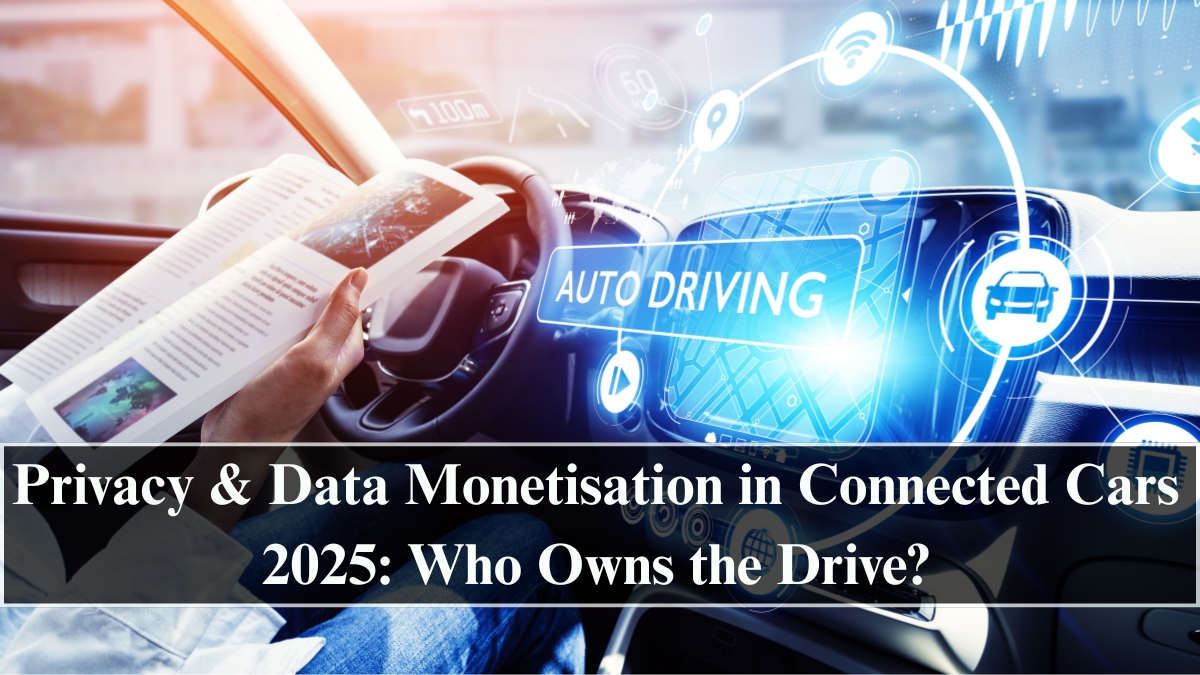In 2025, cars are no longer isolated machines — they are intelligent, connected data hubs generating gigabytes of information every second. From driving behavior and GPS routes to voice commands and biometric data, connected vehicles are creating a new digital economy powered by information. But with that innovation comes a critical question: who owns the data — the driver, the automaker, or the platform?
As automakers, insurers, and service providers race to monetise vehicle data, the automotive world is facing one of its most important ethical challenges: balancing innovation with privacy, consent, and transparency.

The Rise of Data-Driven Mobility
Today’s connected cars communicate with cloud networks, smart infrastructure, and mobile ecosystems around the clock. This connectivity enables advanced features such as predictive maintenance, navigation, driver assistance, and personalized infotainment.
However, every interaction — from braking patterns to location logs — generates valuable insights. According to 2025 industry estimates, the global vehicle data market exceeds $500 billion annually, with automakers viewing data as the “new fuel” of the mobility industry.
Data from vehicles powers multiple sectors, including:
-
Fleet analytics: For optimizing delivery and ride-sharing networks.
-
Insurance models: Using driver behavior for usage-based pricing.
-
Advertising: Delivering targeted content in infotainment systems.
-
Urban planning: Using anonymized mobility data to improve traffic flow.
-
EV optimization: Enhancing charging efficiency based on travel patterns.
While these innovations improve the driving experience, they also raise unprecedented privacy and ownership concerns.
What Kind of Data Do Connected Cars Collect?
Connected vehicles collect three main categories of data:
-
Telematics Data: Speed, location, acceleration, braking, and route history.
-
Infotainment Data: Voice commands, in-car app usage, and contact information.
-
Biometric & Environmental Data: Cabin temperature, seat occupancy, heart rate, and driver posture.
This data is often transmitted to cloud servers for processing — but not all drivers are aware of how much is collected or where it goes.
In 2025, regulations and consumer awareness are pushing automakers to disclose clearer data practices and give users control over data permissions.
How Automakers Are Monetising Vehicle Data
Automakers have found creative ways to transform car data into revenue-generating assets, often in collaboration with tech firms and city infrastructure providers.
Common monetisation strategies include:
-
Data-as-a-Service (DaaS): Selling anonymized driving data to third parties.
-
Subscription Models: Charging users for connected features or predictive analytics.
-
Personalized Ads: Using infotainment systems to display context-aware promotions.
-
Fleet Optimization Tools: Providing analytics platforms for logistics companies.
-
Insurance Partnerships: Sharing telematics data for usage-based premium calculations.
For example, BMW and Mercedes-Benz sell aggregated location data to mapping companies to improve real-time traffic services, while Tesla uses collected telemetry to refine autonomous driving algorithms.
Privacy Challenges in the Connected Car Era
As vehicle data becomes a commercial asset, privacy concerns are intensifying. Many users are unaware of the extent of continuous monitoring, and consent often comes buried within lengthy user agreements.
Major challenges include:
-
Data Ownership: Drivers rarely retain full rights to the information generated by their cars.
-
Consent Management: Difficulty in opting out of certain tracking features.
-
Cross-Border Data Transfers: Complex regulations for vehicles that operate globally.
-
Cybersecurity Risks: Potential for hacking, identity theft, or unauthorized access.
-
Third-Party Data Sharing: Lack of transparency when automakers partner with tech firms.
These issues are prompting global regulators to tighten data privacy laws specific to connected vehicles.
Global Regulations & Ethical Frameworks in 2025
To safeguard consumers, governments worldwide have begun implementing stricter standards for automotive data privacy.
Key frameworks include:
-
GDPR (Europe): Enforces explicit consent and data minimization for connected vehicles.
-
California Consumer Privacy Act (CCPA): Grants drivers rights to access and delete collected data.
-
UNECE WP.29 Regulations: Introduce cybersecurity and software update requirements for all new vehicles.
-
Japan’s Connected Mobility Act: Regulates telematics data collection and cross-border use.
Additionally, automakers are adopting privacy-by-design principles — integrating encryption, edge data processing, and decentralized storage to minimize risks.
The Future of Ethical Data Monetisation
The future of connected car data lies in responsible monetisation, where innovation and user rights coexist. By 2027, the industry is expected to adopt user-centric data marketplaces, allowing drivers to opt-in to share anonymized data in exchange for rewards or discounts.
Emerging solutions include:
-
Blockchain-secured consent systems for transparent data tracking.
-
Edge computing to process sensitive data locally rather than in the cloud.
-
Data-sharing co-ops where users control and profit from their driving information.
-
AI governance models to audit ethical compliance in data usage.
As vehicles become more autonomous, the focus will shift from collecting data to empowering users with control, turning privacy into a competitive advantage for brands.
The Road Ahead: Who Owns the Drive?
The connected car revolution has made data as vital as horsepower — but also as sensitive as personal identity. In 2025, automakers face a defining moment: building a transparent, consent-driven relationship with drivers or risking backlash in the age of data awareness.
The cars of the future won’t just drive smarter; they’ll drive ethically, ensuring that innovation moves forward without leaving privacy behind.
FAQs
What kind of data do connected cars collect?
They collect telematics, infotainment, biometric, and environmental data, such as driving patterns, GPS location, and cabin conditions.
Who owns the data from a connected car?
Typically, automakers or service providers control it, though regulations are pushing for shared ownership with consumers.
How do automakers monetize vehicle data?
By selling anonymized data, offering connected subscriptions, or partnering with insurance and mapping companies.
Are there laws protecting connected car data?
Yes. Regulations like GDPR, CCPA, and UNECE cybersecurity standards protect user privacy and consent in connected vehicles.
What’s the future of data monetisation in cars?
By 2030, drivers will gain more control through blockchain-based consent systems and ethical data marketplaces that reward voluntary data sharing.
Click here to know more.
